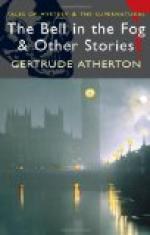With all this, however, he was not utterly content. From the 12th of August until late in the winter—when he did not go to Homburg and the Riviera—he visited the best houses in England, slept in state chambers, and meditated in historic parks; but the country was his one passion, and he longed for his own acres.
He was turning fifty when his great-aunt died and made him her heir: “as a poor reward for his immortal services to literature,” read the will of this phenomenally appreciative relative. The estate was a large one. There was a rush for his books; new editions were announced. He smiled with cynicism, not unmixed with sadness; but he was very grateful for the money, and as soon as his fastidious taste would permit he bought him a country-seat.
The place gratified all his ideals and dreams—for he had romanced about his sometime English possession as he had never dreamed of woman. It had once been the property of the Church, and the ruin of cloister and chapel above the ancient wood was sharp against the low pale sky. Even the house itself was Tudor, but wealth from generation to generation had kept it in repair; and the lawns were as velvety, the hedges as rigid, the trees as aged as any in his own works. It was not a castle nor a great property, but it was quite perfect; and for a long while he felt like a bridegroom on a succession of honeymoons. He often laid his hand against the rough ivied walls in a lingering caress.
After a time, he returned the hospitalities of his friends, and his invitations, given with the exclusiveness of his great distinction, were never refused. Americans visiting England eagerly sought for letters to him; and if they were sometimes benumbed by that cold and formal presence, and awed by the silences of Chillingsworth—the few who entered there—they thrilled in anticipation of verbal triumphs, and forthwith bought an entire set of his books. It was characteristic that they dared not ask him for his autograph.
Although women invariably described him as “brilliant,” a few men affirmed that he was gentle and lovable, and any one of them was well content to spend weeks at Chillingsworth with no other companion. But, on the whole, he was rather a lonely man.
It occurred to him how lonely he was one gay June morning when the sunlight was streaming through his narrow windows, illuminating tapestries and armor, the family portraits of the young profligate from whom he had made this splendid purchase, dusting its gold on the black wood of wainscot and floor. He was in the gallery at the moment, studying one of his two favorite portraits, a gallant little lad in the green costume of Robin Hood. The boy’s expression was imperious and radiant, and he had that perfect beauty which in any disposition appealed so powerfully to the author. But as Orth stared to-day at the brilliant youth, of whose life he knew nothing, he suddenly became aware of a human stirring at the foundations of his aesthetic pleasure.




